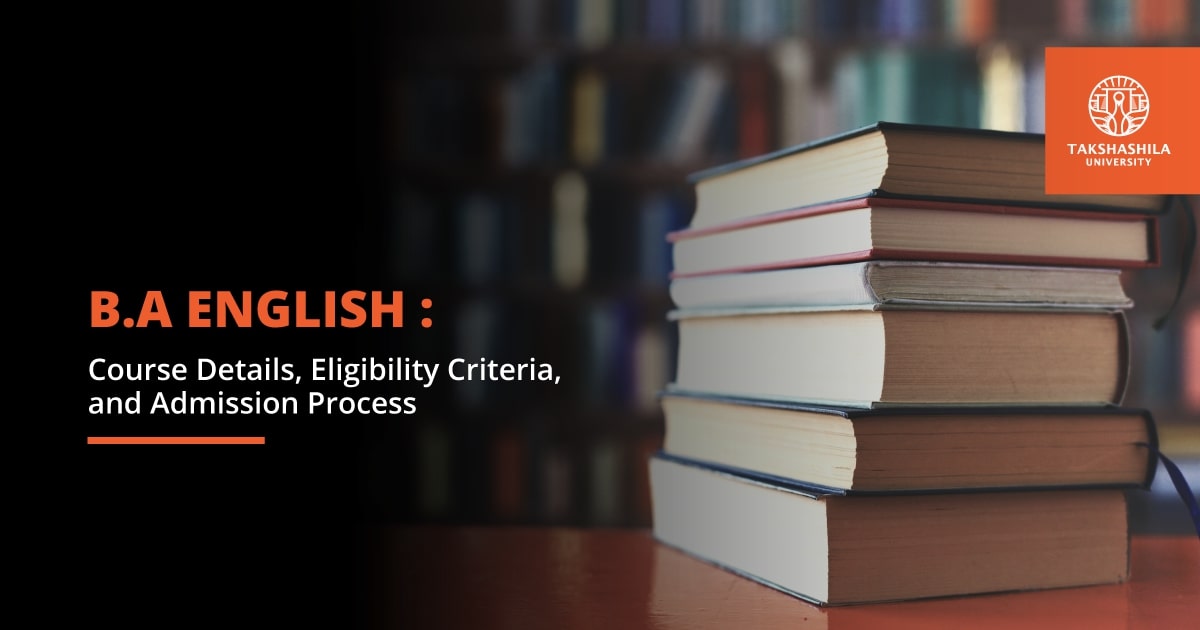Introduction to BA English
BA English at Takshashila University Do you like to read books, study literature, and write? Do you have a thirst for travelling overseas with the help of printed literature? If the answer to these questions is yes, then pursuing a B. A in the English language may be an ideal choice for you.
For instance, a B.A. in English is a three-year degree-level program that falls under undergraduate studies and specializes in English, including its literature and practice. This course takes a holistic approach and includes literature studies that focus on history, theory, and criticism, literature creation, sociology of literature, and business communication.
This course surely guarantees a variety of career opportunities. As a writer, teacher, editor, or media personnel, you can explore the realms of creativity and communication and get a taste of cultures.
Let’s look at all the details, such as B.A English: Course Details, Eligibility Criteria, and Admission Processs will be explained in this article.

Overview of the B.An English Course
B.A English is an integrated course encompassing various subjects associated with language, literature or linguistics. In the first year, students are familiar with the primary literary forms, including poetry, drama, prose, and fundamental language studies. In the second year, students study specific literary eras, such as Renaissance literature and other literature as modern poems and writings. In the concluding year, students study advanced literary theory and contemporary literature, writing skills, and creative or research type of project work.
The program also includes education in writing, speaking and analysing literary works, which can be helpful in many occupations.
Critical Concepts in English Literature
- Literary Genres: The students learn about different literary forms, such as drama, poetry, short stories, and novels. Explaining the rules and structures of these genres enables students to see the full potential of literature.
- Literary Criticism: This branch focuses on questions regarding the possibilities of analysing literature. Feminist, psychoanalytic, post-colonial and historical criticism are some of the different critical approaches students learn.
- Famous Literary Figures: From the greatest playwright, William Shakespeare, to modern writers, the greatest authors, such as Jane Austen, Charles Dickens, T.S. Eliot, and Virginia Woolf, are also discussed. Their texts serve as foundations for many English literature courses.
- Language and Linguistics: Language, accent, and its different transformations are topics in schools. Students learn about syntactic, semantic, phonetic, and pragmatics.
- Creative Writing: Most English courses include creative writing, which helps students improve their knowledge of fiction, poetry, or scriptwriting.
- Cultural Studies: Students are also advised to learn the culture of the works they read. As such, literature is a product of culture, and students are allowed to understand symbols of culture in the works in question as far as identity, gender, race, and change are concerned.
Career Opportunities in English
- Editor: Editors are employed by publishing houses, magazines, or online publications. They write about content, read it in part or in its entirety, and check for grammatical, stylistic, and factual mistakes.
- Journalist: Most English graduates are passionate about writing and reporting news and can practice journalism in different formats, whether print, television or online, covering and documenting events engagingly.
- Public Relations Specialist: Public relations professionals are in charge of an organisation’s public image and are involved in creating press releases, speeches and promotional literature.
- Teacher/Professor: Graduates with bachelor’s degrees in English are often employed as literature or English language tutors in primary and secondary schools, colleges, and universities. After further studies, such people can become lecturers or work in research.
- Author/Writer: Graduates of English can write books, short stories, and scripts for dramas and films. Many aim to be novelists, amateur poets, or screenwriters for television and film.
- Translator: Knowledge of other languages makes it possible for English graduates to work as translators, assisting in converting written messages from one language to another.
- Librarians: These professionals manage and operate libraries, assisting users in accessing sources such as books, journals, and any other readable material. In most cases, a qualified person must have completed further studies in Library Science.
- Human Resources: Every HR function requires communication skills. Some English graduates can work in recruitment, training and development, or corporate communication.
- Media and Advertising: Some English degree holders are employed in media and advertisement sectors, producing ideas for scripts, song duets, and even ads for television and radio as well as web pages.
- SEO Specialist: SEO (Search Engine Optimization) specialists maximise a site or a piece of content to ensure it is ranked highly by search engines; these specialists are often found in media companies, digital marketing agencies or media companies.
Eligibility Criteria for B.An English
- Educational Requirements: A student is expected to have completed his 12th standard with a recognised board in either stream, with Arts preferred. Hailing from a history, political science, or English background in a school is essential, but only in some cases.
- Minimum marks: It is common practice for top colleges to have set a minimum of 50-60 % marks in the 12th-grade exams. Some elite universities may have set cutoffs higher than most due to the competition they face.
- Age Limit: Usually, no upper age limit is provided for B. English courses offered. However, students must have passed their 12th standard examination in order to apply for this course.
Skills Required for B.An English Students
- To be successful in the B.A. English students must acquire specific skills that will assist them in the program and after completion of the program:
- Excellent Writing Skills: One prerequisite is a passion for writing and the capability to articulate one’s thoughts powerfully and artfully. Most of the English significant studies assignments will involve creative writing, including short and long reports, essays, etc.
- Critical Thinking: In this course, the students must read literature, give their opinions on what they have read, and develop educated arguments to substantiate those opinions.
- Effective Communication: One must refrain from assuming proficiency in a language. You must articulate your opinion in writing or a speech.
- Research Abilities: English students conduct research on various literary topics, personalities, and the literary canon. They need to identify, comprehend, and collate relevant material and information.
- Creativity: English literature and composition encompass writing poems, essays stemming from the critical analysis of novels, and articulating thoughts in original ways.
- Attention to Detail: All works of literature are meticulous about details. They include idiomatic expressions, symbols, motifs, and structure, which should be focused on during the reading and, later, the text analysis.
Why Choose Takshashila Engineering College for B.An English?
- Several factors make Takshashila Engineering College a good option for seeking your B.A. English.
- Experienced Faculty: Takshashila’s English Department has qualified and experienced professors with a good mix of theoretical and practical aspects. Above all, they wish to contribute to your development and inspire you to use your brain constructively.
- Wide Range of Subjects: Takshashila’s B.A. English program includes diverse areas such as English literature, poetry, creative writing, and cultural studies. This diversity ensures you receive a holistic education.
- Skill Development: ‘Beyond just classroom teaching…a student must develop key skills such as writing, communicating and analytical. At Takshashila, a college eyeing core practical skills in students, students are provided workshops, seminars, and other extracurricular activities to enhance their practical skills further.’
- Research and Internships: Takshashila students get research facilities and internships with media firms, publishing houses, and NGOs, thus gaining hands-on experience that supplements the theory taught in the classroom.
- Supportive Environment: The college has provisions that give attention to all students and assist them academically via help, counselling, and career advice throughout the course, which creates a very supportive environment.
Admission Process for B.An English
Joint Admission Process for B.A. English has the following non-exhaustive sequence.
- Application Form: Students must complete an application form for personal and academic data both offline and online. Be informed of submission deadlines.
- Entrance Exam (if applicable): Colleges or universities may sometimes conduct an entrance test to measure proficiency in achievements in English, writing and literature. Please ascertain whether the institution asks for this.
- Merit List: After an entrance exam, if taken, the colleges publish merit lists based on the entrance examination performance or 12th-grade marks. If an applicant meets the needed cut-off, they will be included in the shortlist.
- Counseling/Interview: In some colleges, there are counseling or interview sessions to determine your interest in the subject and determine whether you’re suitable for the program.
- Final Admission: Idle candidates, once selected, will be expected to undergo the admission process, which involves the clearance of documents and the payment of fees as a surety for a seat in the course.
Curriculum and Course Structure
B.A English is commonly distributed over a three-year duration period wherein its scope for each year rotates towards different parts of the English language and literature:
- Year 1: Beginner-level literature introduction focusing on major historical languages, developing basic writing skills, and significant periods. Critical thinking and literary analysis are also taught at this level.
- Year 2: Focus on a wider canon of English literature with advanced studies on works of Shakespeare, British literature spanning the 18th—19th brackets, and various literatures worldwide. Students also pick up literary theory and criticism.
- Year 3: Studies in contemporary literature and creative writing, along with possible specific ones such as post-colonial literature, women’s writing, and media studies. Students may do dissertations, projects, or internships.
Top Institutions for B.An English
Some of the best institutions offering B.A English in India include:
- Takshashila College
- Delhi University (DU)
- St. Xavier’s College, Mumbai
- Jamia Millia Islamia, Delhi
- Lady Shri Ram College, Delhi
- Banaras Hindu University (BHU)
- Loyola College, Chennai
FAQs
1.What is the duration of a B.A. English course?
the course lasts for three years.
2.Is B.A. Is English good for people who want to become a professional Writer?
is perfect for anyone looking for a career in writing, be it content writing, advertising, journalism, or publishing.
3.Can I undertake further studies after a B.A. in English?
Definitely yes! Plenty of options, including an M.A. in English, an M.A. in Journalism, an MA in Creative Writing, an MA in Translation, an MA in Education, etc.






